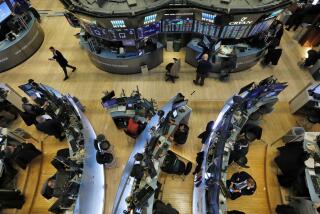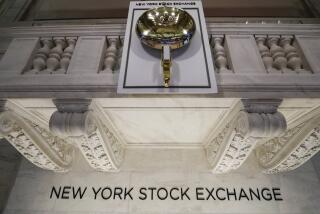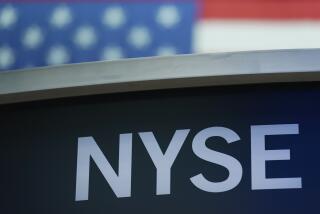U.S. Dollar Rises Against Euro and Yen
- Share via
The U.S. dollar rallied to two-week highs against many European currencies Friday, buoyed by recent comments on inflation from the Federal Reserve. Major international stock indexes ended lower as the U.S. markets were closed in honor of former President Reagan.
With the Fed promising to tackle inflation, buyers regained confidence in the dollar, sending it to its highest level in two weeks against the euro, the Swiss franc and British pound.
The euro fell 0.7 cent to $1.2011 in late European trading, while the pound was down 1.12 cents at $1.8181. The dollar was worth 1.2586 Swiss francs, up from 1.2477, and was valued at 1.3623 Canadian dollars, up from 1.3589.
The dollar also rose to 110.12 Japanese yen, up from 109.50.
In European stock markets, trading was quiet with the U.S. markets closed because of a national day of mourning for Reagan. With little economic news to move the markets, the European indexes remained mixed.
Britain’s FTSE 100 edged down 2.10 points to 4,484.00 in the wake of another rise in oil prices. British airline stocks slid on fears that higher fuel prices would cut into profits. Overall volume on the London market was very light.
“It is thin, which is hardly surprising,” said Rolf Elgeti, a strategist at Commerz Bank. “It is quite normal if you do not get direction from the U.S., as nobody wants to take any big bets, especially before the weekend.”
In other European markets, Paris’ CAC-40 slipped 12 points, or 0.3%, to 3,699.38, while Frankfurt’s Xetra DAX dropped 7.08 points, or 0.2%, to 4,014.56. Trading throughout the European Union was light before the release of the euro zone’s consumer price index data, due out Wednesday.
The European economic recovery, while lagging slightly behind the U.S.’, has been strong recently, leading some investors to consider the possibility of inflation in Europe.
A large jump in China’s consumer prices dragged on Asian stocks. China’s consumer price index rose 4.4% in May from a year ago, the 18th straight monthly rise, spurred by rising food prices. With China’s economy continuing to grow rapidly, investors feel the government may have to step in with major interest rate hikes. The government has signaled it is ready to manage the economy with a strong hand.
The news sent Hong Kong’s Hang Seng index down 26.48 points, or 0.2%, to 12,396.39.
Other Asian markets also reacted negatively. Tokyo’s Nikkei 225 index fell 49.15 points, or 0.4%, to 11,526.82, while Seoul’s Kospi index dropped 30.77 points, or 3.9%, to 751.53.
In Latin American markets, Mexico’s IPC index fell 15.99 points, or 0.2%, to 10,214.51. Stocks in Venezuela fell 1% and were down 0.2% in Brazil, while the major indexes in Chile and Argentina were up 0.2% and 0.1%, respectively.
More to Read
Inside the business of entertainment
The Wide Shot brings you news, analysis and insights on everything from streaming wars to production — and what it all means for the future.
You may occasionally receive promotional content from the Los Angeles Times.










